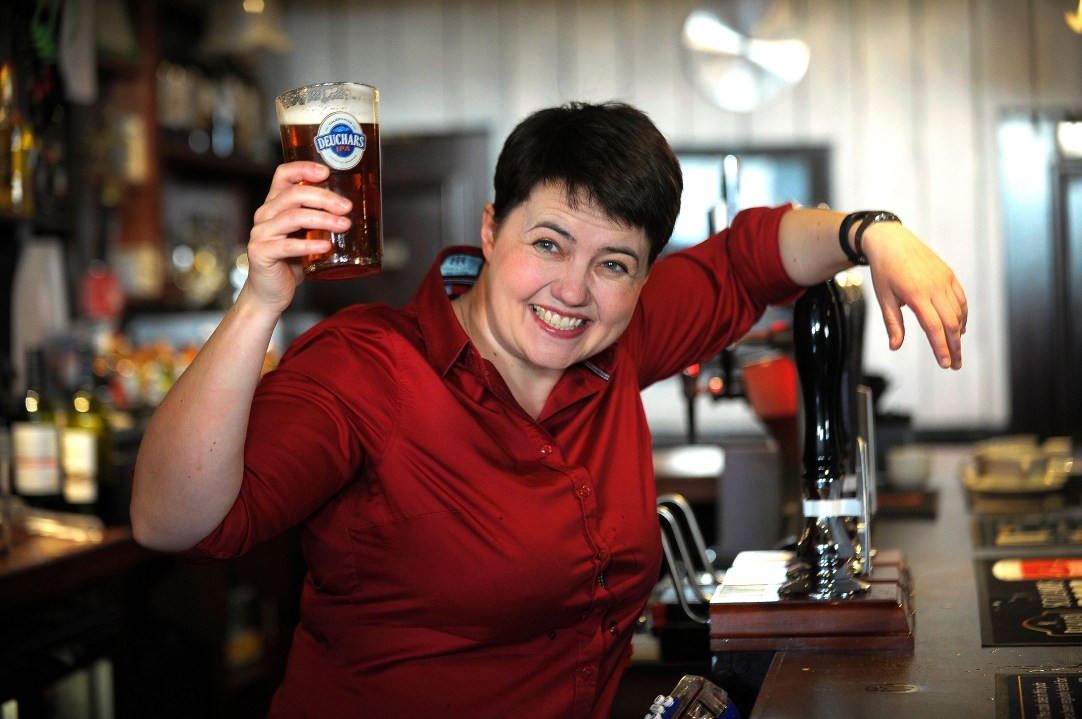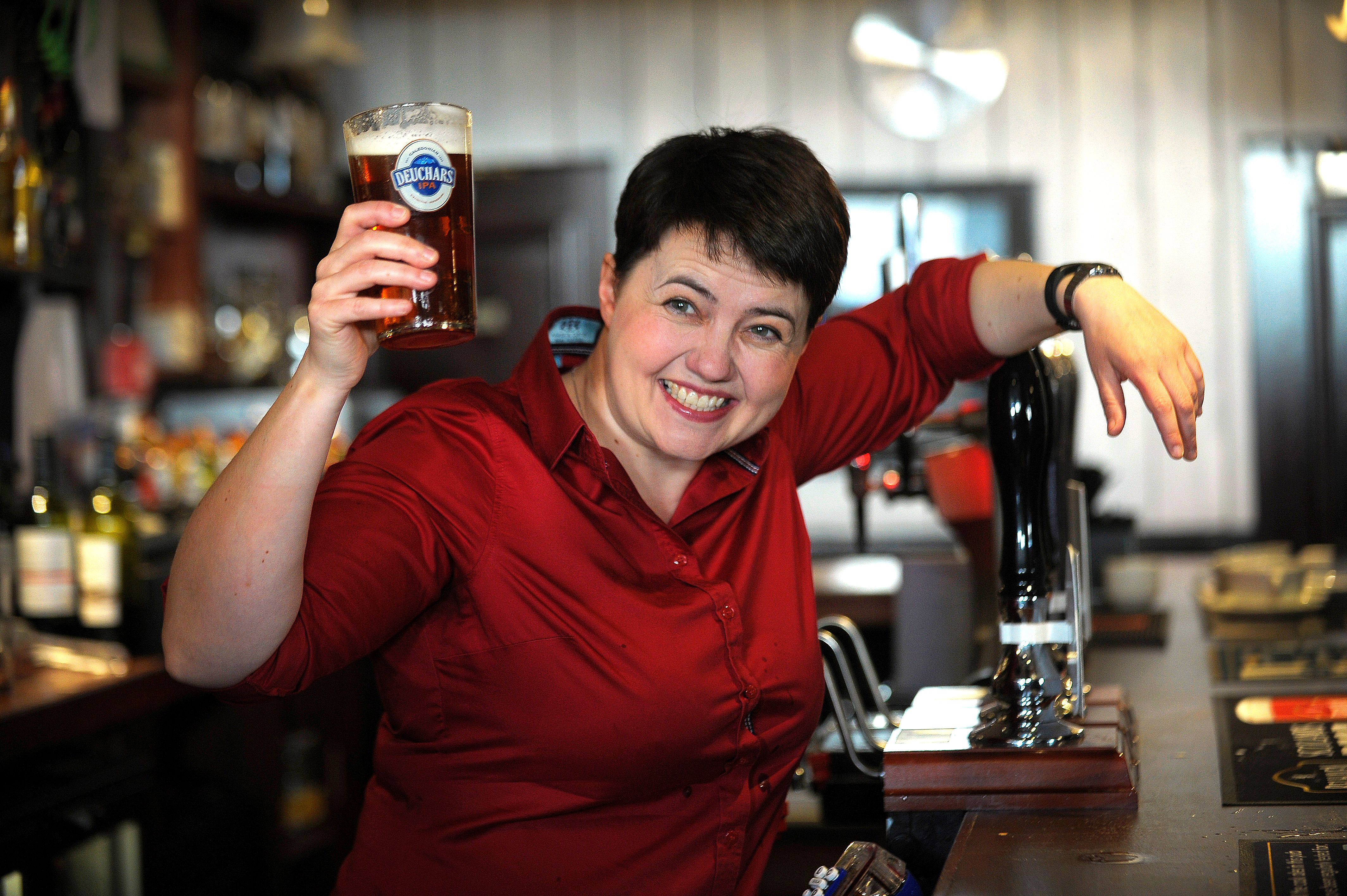At the 1997 general election the Scottish Conservative and Unionist party won 17.5 percent of the vote and lost its last remaining 11 seats in Scotland. Scotland was now a Tory-free zone, at least in terms of its parliamentary representatives.
Nearly twenty years later, the Scottish Conservative and Unionist party might, if next week’s elections to the Holyrood parliament follow the pattern revealed by today’s STV/Ipsos-Mori poll, finish in second-place. They may achieve this on little more than 18 percent of the vote.
In other words, this is Schrodinger’s Revival: it is both real and not real and it all depends upon how you look at, or think about, it. Has Ruth Davidson emerged as a vigorous, capable, Tory leader who can spread the Tory gospel to new congregations? Yes. Have the Tories actually enjoyed a major revival? Up to a point.
Granted, if you allow for all the Tory pensioners who have moved to new, celestial, constituencies in the past 20 years you can make a case that the Conservatives are doing surprisingly well for a party that was declared all-but extinct before devolution saved them from their own preferences. Demographics were supposed to doom the Tories but there they are, still clinging on to the support of between one in six and one in five Scottish voters. Sometimes perseverance earns some small reward.
Today’s poll confirms that the SNP are odds-on to win a new, and probably increased, majority at Holyrood. They may take 70 or 71 of the 129 seats on roughly half the vote. According to one model, the SNP will win 66 of the 73 first-past-the-post constituencies. I fancy they may do even better than that.
That leaves Labour, the Conservatives and the Greens squabbling over the top-up seats available via the second, regional, vote. According to today’s poll, the Tories could take 19 percent of the regional vote and Labour just 17 percent. That, according to another polling predictor, might leave the parliament with 23 Tory representatives and Labour with just 20. A disaster for the erstwhile people’s party of a kind that might prove more shattering than even that which befell the Conservatives in 1999.
And there’s the rub. The Tory list vote might increase by six points – an achievement given they won just 12 percent of that vote in 2011 – but the real story is Labour’s collapse. The data says the Tories might come second but spidey-sense feelings still don’t quite agree with that. The margins between success and failure are precious thin. This is the difference between Yay and Meh.
For instance, the Tories are currently picked to take the final list seat in at least three regions (Highlands, Central and the Northeast) but in each of those contests the final seat is likely to be decided by just three of four hundred votes. Very few votes matter very much in the constituencies but every vote really will matter on the list.
At least it will matter in dividing up the minor spoils. There is ample anecdotal evidence – now supported by some polling data – that a good number of middle-class Scots have decided to endorse the Tories, often for the first time.
That makes sense, too. Ruth Davidson enjoys complaining that there’s been no healing process since the independence referendum and that Nicola Sturgeon is keeping some kind of national psychological ‘wound’ open but the truth is the Tory leader also benefits from slicing it open again. She needs the support of Scotland’s ultra-Unionists. If she can’t win those votes, she’ll definitely come third.
Which, doubtless, is why Kezia Dugdale has ramped up her own rhetoric on the national question, committing Labour to opposing any moves towards a second referendum in the next parliament. Dugdale too asks that we ‘move on’ from constitutional issues but the difference between Kez and Ruth is that the Labour leader actually means it. She has to, since a return to ‘normal’ politics is Labour’s only hope.
Unfortunately, there is no ‘normal’ politics to which to return. Labour needs the support of its lifelong supporters who voted Yes and then switched to the SNP last year. But there is precisely zero evidence of those lost sheep returning to the Labour flock.
And why would they? The referendum divided the country – as such contests are wont to do – and forced everyone onto some kind of ballyhooed ‘journey’. It was, for the vast majority of voters, a journey bought on a one way ticket. If you moved to Yes, you’re not coming back to Labour. If you moved to No you’re most unlikely to support the SNP. (There are some exceptions but not many: according to one recent poll just eight percent of Yes voters intend to support Labour next week, for instance.)
That then dictates where you are on everything else. The national question dwarfs all others. If you’re Yes you’re still going to vote SNP (in your constituency at least) even if you deplore parts of the SNP government’s rhetoric. Why would you sacrifice the idea of another shot at independence just because you think Kezia Dugdale has something interesting to say about the NHS? (She doesn’t of course; this is a hypothetical exercise.)
Anyway, if you support independence the chances are that you have decided to like the SNP’s other policies too. That’s why the SNP conference could cheer Nicola Sturgeon when she endorsed the idea of a 50 percent tax rate in 2015 and cheer her again when she repudiated the idea of a 50 percent tax rate in 2016. People can be flexible when they need to be.
So, however much they might wish it otherwise, Labour are locked into a battle for Unionist votes. They can’t win without Yes voters but they can’t win those Yes voters either. (Nicola Sturgeon can’t lose them either. She could have booked a cruise to the caribbean for this election campaign and it wouldn’t have cost her any appreciable number of votes.)
But because Labour want everyone to move on from the national question they must pretend that it is settled and of little account. Let bygones be bygones! But the bygones haven’t even gone. Nothing, in any part of the election, has excited or enraged voters so much as talk of another referendum. That’s what the Nats cheer and Unionists deplore. It is about the only thing to draw a reaction in an otherwise soporific campaign.
Labour, however, cannot be beastly about Yes voters and they cannot afford to annoy No voters either. Which leaves them adrift and all at sea. Who are they talking to? It is not entirely clear.
At least Ruth Davidson knows for whom she speaks: the 55 percent of Scots who voted to preserve the United Kingdom. That gives her an ‘In’ denied to Kezia Dugdale and it gives her a measure of credibility too.
She has run a muscular but modest campaign, promising little except her willingness to kick Nicola Sturgeon in the shin at every available opportunity. Someone, she suggests, needs to and if Labour can’t or won’t it might as well be Ruth.
Elsewhere today, Labour launched their manifesto. The poor lambs.








Comments